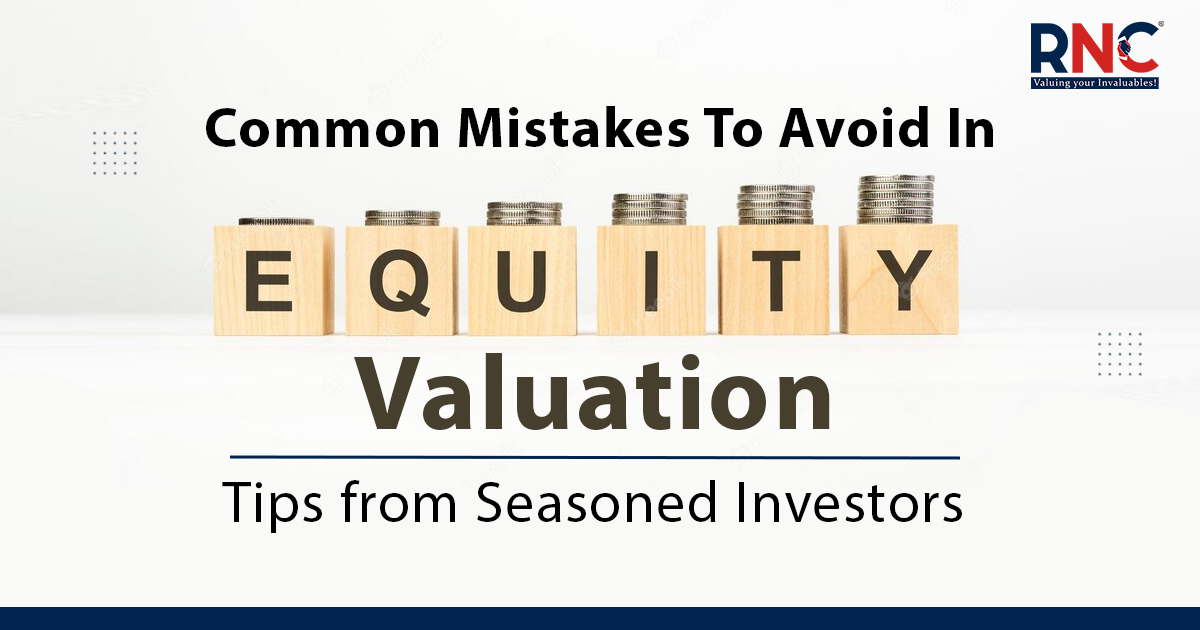
In 2025, volatile markets and evolving SEBI-IBBI regulations have made equity valuation far more complex than before.
A single error in assumptions, discount rates, or peer benchmarking can distort enterprise value — affecting investors, lenders, and even board decisions.
This guide from RNC highlights the most common mistakes businesses make during equity valuation and shows how to prevent them with expert-backed methods and compliance practices.
Valuing equity plays a role in the world as it determines the true value of a company’s shares. This evaluation is highly significant for individuals who own homes or properties investors, businesses and professionals in the insurance sectors. Both valuation firms and investors rely on equity valuation to make informed decisions. However experienced investors can fall into pitfalls that greatly impact the results of their valuations. In this blog post, we will explore these mistakes in depth. Share advice from seasoned investors on how to avoid them.
How to Validate Your Equity Valuation
-
Cross-Verify Forecast Assumptions with audited financials and industry growth data.
-
Reconcile DCF and Market Approach Results to ensure consistency.
-
Apply Scenario Testing: Base, optimistic, and stressed cases.
-
Document Sources: Clearly cite data for transparency and audit readiness.
-
Comply with Standards: Ind AS 113 / ICAI VS-102 / IBBI Rules 2025.
Share advice from seasoned investors on how to avoid them.
1. Overlooking Fundamental Analysis:
One common mistake in equity valuation is giving importance to technical analysis while disregarding fundamental analysis, which forms the foundation of business valuation. Valuation firms are aware that technical analysis can be useful for short-term predictions.
However, it is equally crucial to assess a company’s health, competitive advantages and growth prospects through analysis, for long-term valuations. Relying solely on indicators can lead to an understanding of a company’s actual worth.
Tip: Experienced investors suggest that valuation firms should incorporate both fundamental analyses in order to obtain an understanding of a company’s worth and its potential for expansion.
Read More : The Impact of Industry and Economic Factors on Business Valuation
2. Neglecting Industry and Market Trends:
Valuing equity is not a task. It’s crucial to consider industry and market trends to avoid making assessments of a company’s growth potential and competitiveness, in its sector. Valuation firms need to take into account industry dynamics, emerging technologies, regulatory changes and market sentiments as these factors significantly impact a company’s valuation.
Tip: It’s important to stay updated on the trends in business valuation and industry changes in order to make informed and precise valuations.
3. Over Reliance on Past Performance:
One common mistake in equity valuation is relying heavily on a company’s performance as an indication of its future success. While historical data provides insights, valuation firms should also consider the company’s market position, innovation pipeline and adaptability to evolving market conditions for a more realistic evaluation.
Tip: To make a business valuation of the company’s worth it is essential to strike a balance between performance and current market conditions.
[Precision vs. Reality: Exploring Challenges in Equity Valuation]
4. Failing to Account for Risk Factors:
Neglecting or underestimating risk factors can have implications, on equity valuation. Valuation firms understand that every company faces risks associated with its industry, competition, regulations and internal operations. Disregarding these risks can result in a valuation that poses risks for investors.
Tip: Valuation firms must analyze risks. Incorporate them into their assessment process to arrive at a more reliable and precise valuation.
Top Business & Asset Valuers With An Extensive Portfolio of Valuation Services
5. Disregarding Comparable Company Analysis:
When evaluating a company’s worth, in the market it is crucial to compare its valuation metrics with those of companies. Neglecting this analysis can lead to an assessment of the company’s competitive standing.
Tip: To thoroughly assess a company’s value about its industry it is essential to conduct an analysis that compares it with similar companies. This analysis provides insights into the company’s valuation.
6. Failing to Adapt to Changing Circumstances:
The fair market value represents the price at which a willing buyer and a willing seller would agree upon an arm’s length transaction. It assumes that both parties have reasonable knowledge about the business and its financials. Fair market value is essential for tax purposes, financial reporting, and legal proceedings, and it ensures a fair and unbiased valuation.
7. Business Valuation Services:
The world of markets is constantly. Economic conditions can shift rapidly. Valuation models must adapt to these changes to provide up to date and results. When valuation models fail to account for evolving market conditions investors may be exposed to risks.
Tip: Valuation firms should regularly. Revise their models to ensure they reflect the market conditions and economic developments. Being flexible is essential for valuations.
Read More: What Factors Are To Be Considered While Doing Business Valuation?
Conclusion
Determining the value of equity is a process that requires attention to detail, a deep understanding of the industry and the ability to consider both quantitative and qualitative factors. Experienced investors have learned lessons from their experiences and mistakes. They emphasize the importance of combining technical analysis keeping an eye on industry trends factoring in risk elements and remaining adaptable in the face of change.
By avoiding the pitfalls mentioned above and following advice from investors and valuation firms, individuals in various sectors such as homeownership, property ownership, investment, business management, finance professionals or insurance can make more precise decisions when it comes to equity valuation.
An informed valuation acts as a guide for successful investments and solid financial planning. It assists stakeholders in navigating the intricacies of the world with confidence. Remember that investing in knowledge and understanding is always the step towards making financial choices.
Read Similar Topics:
How Revenue Is Important in Business Valuation
Top 8 Situations Where Business Valuation is Needed
FAQs:
1. What causes most equity valuation errors?
Poor data hygiene, unrealistic forecasts, and ignoring risk adjustments.
2. Which method is best in 2025?
A blended DCF + market multiple approach validated with AI-driven benchmarking.
3. How often should valuations be reviewed?
At least once a year or before any major fundraise or transaction.
4. Who can perform equity valuations in India?
Only IBBI-registered valuers under Companies Act Sec. 247.

About the author:
Sahil Narula
Sahil Narula is the Managing Partner at RNC Valuecon LLP and a Registered Valuer with IBBI. He brings over a decade of experience in Valuation Services, Corporate Finance, and Advisory, having led numerous complex assignments under the Insolvency & Bankruptcy Code, 2016, Mergers & Acquisitions, Insurance, and Financial Reporting.
He is a regular speaker at national forums (ASSOCHAM, CII, ICAI, IBBI, Legal Era) and currently serves as Co-Chairman of ASSOCHAM’s National Council on Insolvency & Valuations and a member of CII’s Task Force on Insolvency & Bankruptcy.
🤝Connect with Sahil on LinkedIn.
